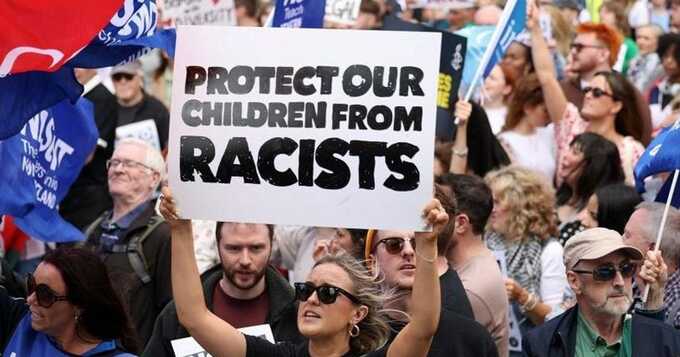UK must curb rise in racist hate speech by politicians and public figures, UN says

Review also highlights racial profiling in police practices, and failure to address legacies of colonialism and slavery
The UK must act to curb a sharp increase in the use of racist hate speech by British politicians and high-profile public figures, a UN body has said.
Ministers must “adopt comprehensive measures to discourage and combat racist hate speech and xenophobic discourse by political and public figures” and ensure that such cases are “effectively investigated and sanctioned”, the UN Committee on the Elimination of Racial Discrimination recommended in a report.
The committee members declined to name which politicians or public figures had made comments triggering the committee’s concern, but added there were “so many credible reports” of racist comments by high-profile individuals that there was “no doubt that the issue is a serious one in the UK”.
Presenting the report on Friday based on a four-year review into Britain’s record on tackling race discrimination, the committee highlighted “very troubling” manifestations of racism within the UK, flagging particular concern about racial profiling in stop and search practices, and the “excessive and deadly” use of force by law enforcement.
Committee members were “particularly concerned about the high number of strip-searches carried out on children, especially children of African descent, by law enforcement officials, and at the increase of police presence in schools with higher proportions of ethnic minority children”.
The government should “take steps to address the over-policing of schools with higher proportions of ethnic minority pupils and adopt and strengthen legislation and other measures to explicitly prohibit strip-searches on children”, the report advised.
Officials sought to identify trends where the UK’s record on eliminating racial discrimination had deteriorated since 2016, when the UN body last published its research. It noted new concerns about “recurring racist acts, violence and hate speech against ethnic and ethno-religious minorities, migrants, refugees and asylum seekers by extremist far-right and white supremacist individuals”. It was concerned about a rise of xenophobic rhetoric in the print and broadcasting media and on social media.
The committee commended the “swift action” taken by authorities in response to the riots earlier this month. But Gün Kut, the Turkish academic and UN committee member leading research into the UK, said there was a link between racist rhetoric from politicians and the recent rioting.
“There is direct connection between the actions of public figures and racial discrimination,” he said. “We’ve seen several examples of this in the case of the UK. There is a direct link between what the politicians and public figures say and what happens afterwards.”
The committee said Britain had yet to address the legacy of its imperial and colonial past and had failed to incorporate “balanced accounts of the history of colonialism and chattel enslavement in the British empire and colonialism in the school curricula”.
It said the “lingering legacies of colonialism and chattel enslavement continue to fuel racism, intolerance, racial stereotypes and racial discrimination”.
The UK should “consider making a formal apology” for its involvement in slavery and commit to reparations, the committee said. It should also intensify its efforts to acknowledge past wrongs and raise awareness of the “impacts of colonialism and the trafficking of enslaved people and their connection to the present-day manifestation of systemic racism”.
The committee noted it was also “concerned about the complexity of the Windrush compensation scheme, which creates undue burden on the claimants” and about the “profound negative impact of the ‘hostile environment’ legislation” on people of the Windrush generation.
Sunder Katwala, the director of British Future, a thinktank working on immigration, integration and race, said politicians’ use of terms such as “invaders” and “illegals”, and slogans such as “stop the boats”, along with classifying male refugees as “men of fighting age”, was “probably legitimising violent responses”.
“It gives people permission to say that if the government has failed to sort issues out, maybe they should take it upon themselves,” he said.
All member states are reviewed regularly by the UN to assess their compliance with an international convention on eliminating racism. Most of the research for the study was compiled under the outgoing Conservative government, and the official UK response to the UN’s preliminary findings was also provided by that administration.
The UK said it was “taking the action needed to address negative disparities wherever they exist” and suggested that “recent increases in police-recorded hate crime were likely to have been driven by improvements to police recording practices and a better identification of what constitutes hate crime”.
The Ministry of Communities has been approached for comment.
Read more similar news:
Comments:
comments powered by Disqus
































